Library
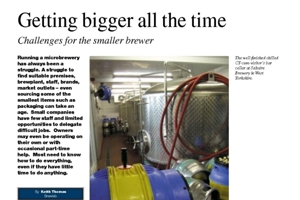 CIBD Membership Required
CIBD Membership Required
Getting bigger all the time
By: Keith Thomas
01/02/2007
Running a microbrewery has always been a struggle. A struggle to find suitable premises, brewplant, staff, brands, market outlets – even sourcing some of the smallest items such as packaging can take an age. Small companies have few staff and limited opportunities to delegate difficult jobs. Owners may even be operating on their own or with occasional part-time help. Most need to know how to do everything, even if they have little time to do anything.
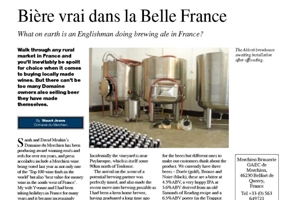 CIBD Membership Required
CIBD Membership Required
Bière vrai dans la Belle France
By: Stuart Jones
01/02/2007
Walk through any rural market in France and you’ll inevitably be spoilt for choice when it comes to buying locally made wines. But there can’t be too many Domaine owners also selling beer hey have made themselves.
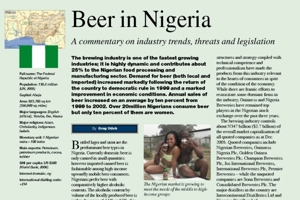 CIBD Membership Required
CIBD Membership Required
Beer in Nigeria
By: Greg Udeh
01/02/2007
The brewing industry is one of the fastest growing industries; it is highly dynamic and contributes about 25% to the Nigerian food processing and manufacturing sector. Demand for beer (both local and imported) increased markedly following the return of the country to democratic rule in 1999 and a marked improvement in economic conditions. Annual sales of beer increased on an average by ten percent from 1999 to 2002. Over 20million Nigerians consume beer but only ten percent of them are women.
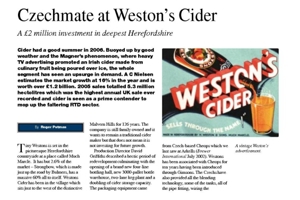 CIBD Membership Required
CIBD Membership Required
Czechmate at Weston’s Cider
By: roger
01/02/2007
Cider had a good summer in 2006. Buoyed up by good weather and the Magner’s phenomenon, where heavy TV advertising promoted an Irish cider made from culinary fruit being poured over ice, the whole segment has seen an upsurge in demand. A C Nielsen estimates the market growth at 16% in the year and is worth over £1.2 billion. 2005 sales totalled 5.3 million hectolitres which was the highest annual UK sale ever recorded and cider is seen as a prime contender to mop up the faltering RTD sector.
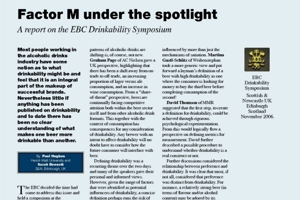 CIBD Membership Required
CIBD Membership Required
Factor M under the spotlight
By: Paul Hughes, Sarah Bennett
01/02/2007
Most people working in the alcoholic drinks industry have some notion as to what drinkability might be and feel that it is an integral part of the makeup of successful brands. Nevertheless little if anything has been published on drinkability and to date there has been no clear understanding of what makes one beer more drinkable than another.
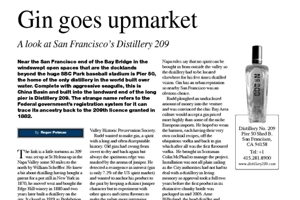 CIBD Membership Required
CIBD Membership Required
Gin goes upmarket
By: Roger Putman
01/02/2007
Near the San Francisco end of the Bay Bridge in the windswept open spaces that are the docklands beyond the huge SBC Park baseball stadium is Pier 50, the home of the only distillery in the world built over water. Complete with aggressive seagulls, this is China Basin and built into the landward end of the long pier is Distillery 209. The strange name refers to the Federal government’s registration system for it can trace its ancestry back to the 209th licence granted in 1882.
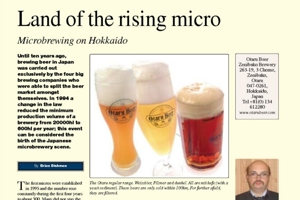 CIBD Membership Required
CIBD Membership Required
Land of the rising micro
By: Brian Dishman
01/02/2007
Until ten years ago, brewing beer in Japan was carried out exclusively by the four big brewing companies who were able to split the beer market amongst themselves. In 1994 a change in the law reduced the minimum production volume of a brewery from 20000hl to 600hl per year; this event can be considered the birth of the Japanese microbrewery scene.
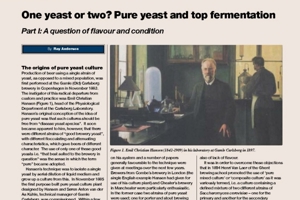 CIBD Membership Required
CIBD Membership Required
One yeast or two? Pure yeast and top fermentation
By: Ray Anderson
01/02/2007
Production of beer using a single strain of yeast, as opposed to a mixed population, was first performed at the Gamle (Old) Carlsberg brewery in Copenhagen in November 1883. The instigator of this radical departure from custom and practice was Emil Christian Hansen, head of the Physiological Department at the Carlsberg Laboratory.
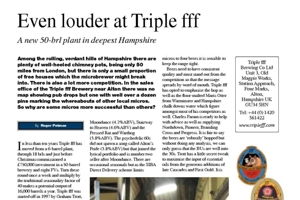 CIBD Membership Required
CIBD Membership Required
Even louder at Triple fff
By: Roger Putman
01/02/2007
Among the rolling, verdant hills of Hampshire there are plenty of well-heeled chimney pots, being only 50 miles from London, but there is only a small proportion of free houses which the microbrewer might break into. There is also a lot more competition. In the sales office of the Triple fff Brewery near Alton there was no map showing pub drops but one with well over a dozen pins marking the whereabouts of other local micros. So why are some micros more successful than others?
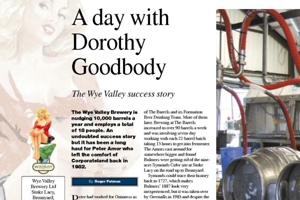 CIBD Membership Required
CIBD Membership Required
The Wye Valley success story
By: Roger Putman
01/02/2007
The Wye Valley Brewery is nudging 10,000 barrels a year and employs a total of 18 people. An undoubted success story but it has been a long haul for Peter Amor who left the comfort of Corporateland back in 1982.
Some of the content requires an active membership to view.
You can find out more here
Some of the content requires an active membership to view.
You can find out more here
